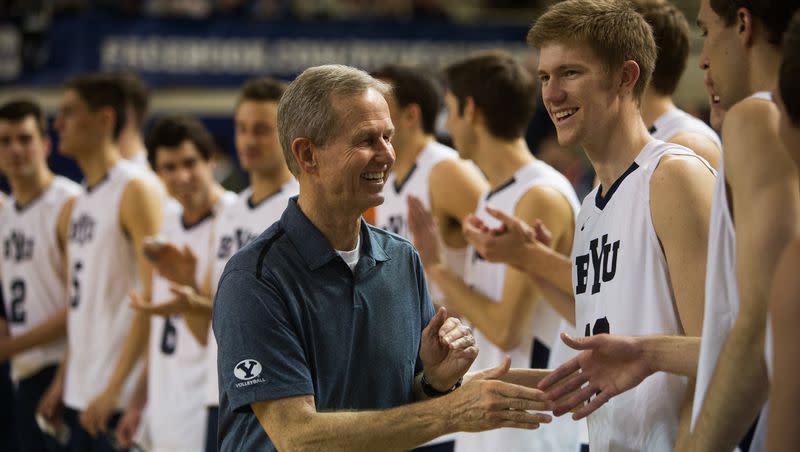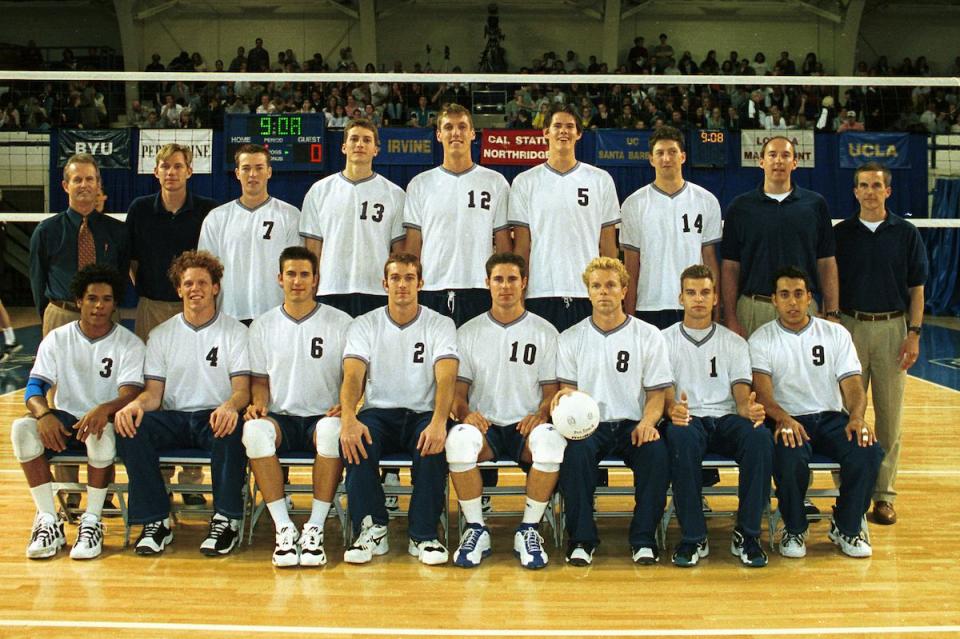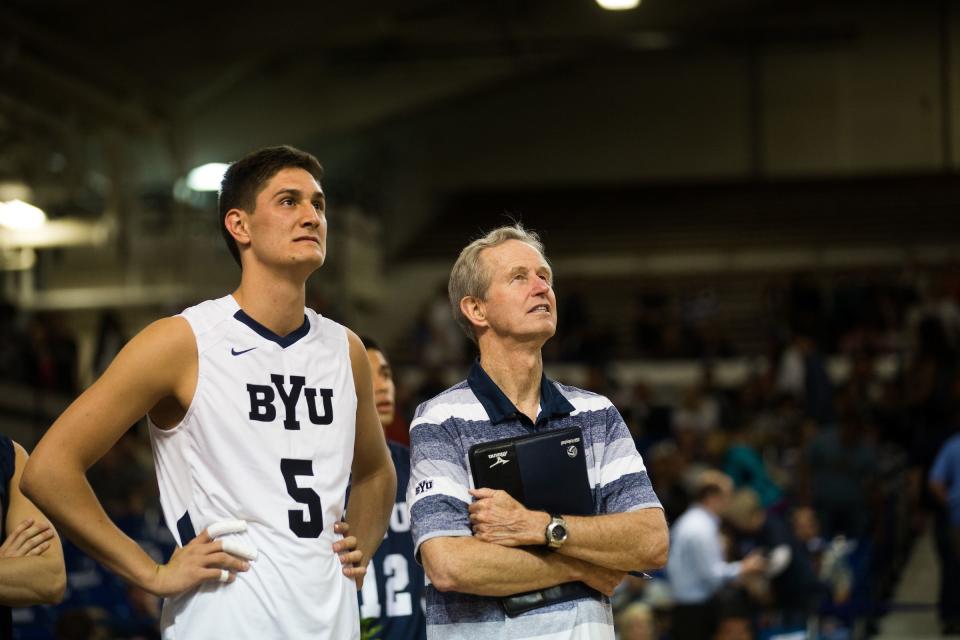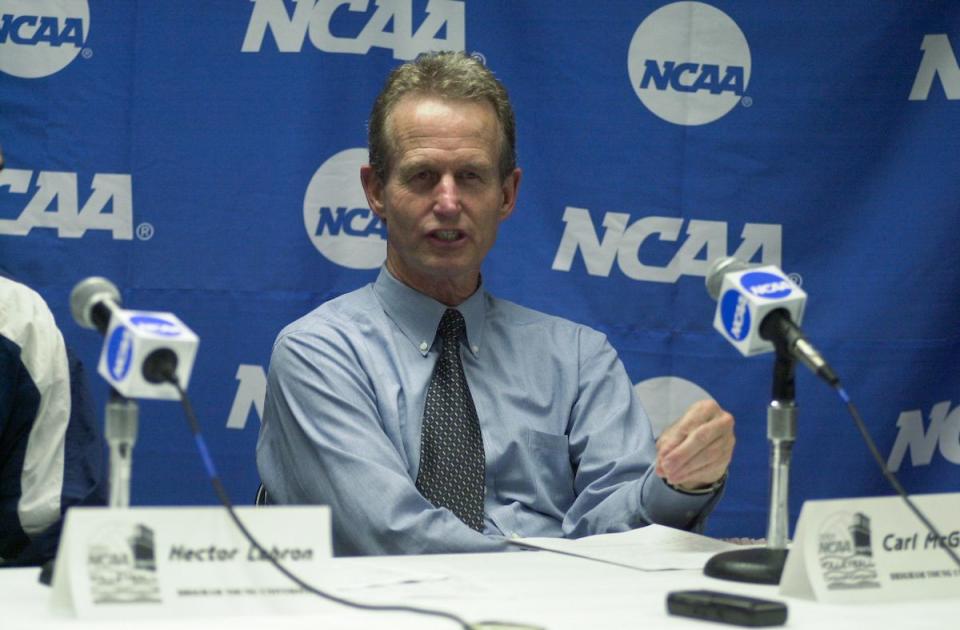Former BYU coach Carl McGown put BYU volleyball on the map, but he did a lot more than that

As the sun neared its setting on a warm Southern California evening in the early 1950s, a young Carl McGown could be found in what today may seem an unlikely place.
The future volleyball savant was not serving or setting or spiking, though that was one of his hobbies. Instead he was driving and chipping and putting — with his mom. McGown’s mother would return from work and the pair would soon head to a nearby course, fostering Carl’s love for a sport that would remain important to him throughout his life.
Those one-on-one moments playing golf together were special and impactful for a mother and a son who bore the burdens of an absent husband and father while at the same time caring for Carl’s grandmother and handicapped brother James.
The sport he grew up playing with his mother continued to be one of McGown’s favorite hobbies later in life; he bought a home near a golf course when he worked at BYU.
“He was as happy as he could be out on the golf course in the evenings,” Chris McGown said of his dad; something that must have been nostalgic for the man who grew up doing just that with his mother.
He took advantage of the course near his Provo home, hitting a bucket of balls before and after teaching classes at BYU. But once the university began its men’s volleyball program in the early 1990s with the Long Beach native at the helm, Carl had less time on his hands for golf.
An uneasy beginning
Things were not easy for Carl as BYU’s first men’s volleyball coach, trying to get the program on its feet. His teams posted losing records in their first three years, before finally securing a winning season in 1993.
“When I first got to BYU, it was a bunch of us that came … the team wasn’t very good,” Hugh McCutcheon said of his time playing volleyball for the school from 1991-93. “We didn’t make it much better and I think it was probably extremely frustrating for Carl. We went 2-27. We worked hard, but we were young and we didn’t know much about playing volleyball and we were playing in the toughest league in the country.”

McGown’s program teetered between mediocrity and excellence for nearly a decade as it continued to gain its footing. However, in 1999, the Cougars catapulted to a 30-1 record and won a national championship in just their 10th season. Things came full circle for McGown to get to the top, his team sweeping Long Beach State, his hometown school, in the final match.
Chris describes those days when his father grew up in Long Beach as Southern California’s golden era. However, looking back later in life, Carl would not have defined his early years as his golden era, the young boy being far from the disciplined man he would become.
Defining moment
“He describes his youth as kind of this wasted period of his life where he just was useless and no good and kind of alludes to all the trouble he’d get into,” said Chris. “He went through this transition in his early 20s where he decided he was going to do something with his life and that he was smart. He was kind of wasting all of these natural gifts that he had.”
Carl was working as a postman when he came to this realization, feeling he had much more to offer the world. His newfound self-aware attitude grew as he joined the Army, mastering his assignments before choosing to attend school at BYU.
It was in Provo that he met his wife Susan — another factor that motivated him to reach his full potential.
At BYU he continued to feed his drive to learn. His aptitude for athletics and knack for knowledge and teaching led him to get a degree in physical education before ultimately earning a Ph.D. in motor learning from the University of Oregon.
The McGowns then moved back to California, but soon thereafter made a difficult decision to leave family and the warmth and sun of their home state to relocate in Utah, where Carl accepted a position as a professor at BYU.
From SoCal to Utah
Despite missing his old California haunts, Carl embraced his new home in Utah. True to his dedicated all-in attitude he did so with great enthusiasm. The BYU professor could not golf through Utah’s cold, snowy winters, leading him to take on another hobby — skiing. His ambitious, curious nature led him to learn all he could about skiing and strive to improve his skills on the slopes.
Related
BYU volleyball remains hot, bests USC for fifth consecutive win
BYU volleyball holding its own vs. ranked teams. Here’s why it’s validating
His skiing knowledge and experience ultimately landed him a class teaching the sport at BYU. But professor work was not Carl’s sole job when he arrived at the Provo university. He chose to remain involved in volleyball as well.
“In the summertime he would go coach with USA (volleyball),” said Shawn Olmstead, who took McGown’s ski class while playing volleyball at BYU before becoming the school’s current men’s volleyball coach. “He loved his job. … It was easy and it wasn’t a crazy schedule at the university level.”
McGown began coaching USA men’s volleyball in the 1970s, having a stint as the head coach in the middle of the decade. While in charge of the national team he asked future hall of fame coach Marv Dunphy to be an assistant, leading to a wonderful friendship that saw the two coaches compete with and against each other in various capacities over the years.
“He asked me to be his assistant with the USA team at the Pan American Games in Mexico City and then we went to the Olympic qualification tournament in Rome,” Dunphy said. “To this day, actually, I often think of it. Why me? Why was I so lucky to cross paths with this guy?”
A learner and a teacher
Years later, Dunphy decided to pen a heartfelt thank you letter to McGown, expressing his profound gratitude for his friend. A week or so later, he received the letter back with one line: “Marvy, ‘grateful’ only has one L.”
“That was Carl,” Dunphy said. “He was to the point. … I tell that story and everybody that knows him just says, ‘Wow, that’s him in a nutshell.’”
He was always learning and tremendous at sharing that knowledge with others.
“He was incredibly thoughtful,” Chris McGown said. “There wasn’t a day that went by that he didn’t have a book; his nose in a book, trying to read something or learn something about just everything that he was interested in. Be it finances or gardening or volleyball or skiing or golf or just anything that he got excited about. He wanted to learn everything there was to learn about it.”
Chris rarely saw his father watch television, instead observing Carl’s passion for reading and studying — something the inquisitive professor did most every evening. Chris was not the only one that took notice of his dad’s impressive drive for knowledge.
“One of the things that’s great about Carl is he was really curious,” McCutcheon said. “His commitment to being a lifelong learner was real.”
He was also committed to teaching what he learned. In the late 1960s Carl headed to Poland, one of the world’s leaders in volleyball, on a government grant to study how they trained for and played the sport. Upon returning, McGown wrote a report about what he had learned from Poland’s volleyball tactics while on the Soviet side of the Iron Curtain.
Volleyball pioneer
Carl was ahead of his time when it came coaching volleyball, focusing on analytics long before sports were emphasizing such a thing.
“That data was really impactful,” McCutcheon said of McGown’s data-driven approach to coaching. “I think nowadays, through a lot of different technologies, more people have access to it, but I think in that time it was a critical competitive advantage.”
Dunphy also saw Carl’s foresight firsthand and how it impacted matches.
“There was lots of logic behind what he did,” recalled Dunphy. “He said, ‘Hey, here’s what the numbers say, and we’re going to follow the numbers.’ And he stayed the course.”
McGown’s focus on data was just another way he used his background in education to his advantage as a coach.
His focus on education rubbed off on Dunphy, even convincing the Pepperdine coach to leave his post at the California school to pursue a doctorate degree in Physical Education at BYU right after winning a national title with the Waves.
Related
Lessons learned: After challenging 2022 campaign, BYU volleyball off to strong start
BYU men’s volleyball won’t be moving to the Big 12 — and here’s why that’s OK
“He was always on me,” Dunphy said of McGown’s persistence in encouraging him to get his terminal degree. “No time is perfect, but that was the time for me.”
Dunphy spent his first year at BYU living in the McGowns’ home while Carl was on sabbatical at UCLA. When Carl returned to Provo, he continued to be supportive of his friend as Dunphy completed his degree.
A force for good
However, McGown influenced many people for good besides Dunphy.
“I’d like to think I was special,” Dunphy said. “But he was that way. … He inspired lots of people in a unique way. He wasn’t a used car salesman to falsely pump somebody up. He gave it to you straight.”
Carl’s sincerity, knowledge and desire to help others become their best selves made him a master mentor that helped grow volleyball on multiple stages.
“He was always ready to share (his knowledge) at any level with any person,” Dunphy said. “I’ve seen him just with a rookie, rookie coach. There’ll be 150 coaches at this clinic and he’s having breakfast, lunch and dinner with a sixth-grade volleyball teacher who got the coaching assignment.”
Still, when the request came for him to be BYU’s first men’s volleyball coach, McGown was hesitant.
“They knew who Carl was,” Olmstead said. “They knew what he did in the summer. And they just essentially forced him and he said, ‘No, I really like my schedule. I like my job.’ And they said, ‘Well, you don’t have a choice. You’re going to be our coach.’ From there it went for the next however many years of his time here at BYU.”

“I just don’t think he saw it coming,” Chris said of his dad being tabbed as the inaugural BYU men’s volleyball coach.
But reluctantly, Carl accepted the position. When BYU hired him, it got a talented, polished man who was much more than a volleyball coach. He was highly motivated in everything he did and coaching was just one of those things.
“If you were going to be in his orbit, you had to do your best,” Chris said. “There was that coupled with a level of discipline that was probably unusual. You just don’t see those two things where I’m trying to do my best all the time and I’ve got this unbelievable kind of discipline.”
The McGown advantage
Carl’s discipline and ability to face challenges head on and learn all he could in order to overcome obstacles was a very advantageous trait for coaching.
“I’m sure many times he was wondering what he was doing coaching volleyball and maybe he should go back to teaching motor learning,” McCutcheon said. “But he stuck with it and as he evolved, we evolved. … So like any moments of adversity, you have a decision to make and he chose to lean in and got the lessons learned and got better at his craft and we got better at our craft and pretty soon we were winning more than we were losing.”
After pushing through years of frustration at BYU, Carl, with McCutcheon now at his side as one of his assistants, saw his efforts propel the program’s rise to national prominence at the turn of the century.
“While I was there, as a coach, we won two national championships in ’99 and 2001,” McCutcheon said. “So it was satisfying for me and, I’d imagine, profoundly satisfying and validating for him to go from the outhouse to the penthouse.”
Years later, Carl would use his moments of adversity at BYU to help teach other coaches at clinics.
“He would say, ‘I wish upon all of you a 2-27 season’” Chris said. “People would kind of sit up straight. … And he says, ‘Because you know what happens when you go 2-27? You will do anything to not let that happen again.’”
McGown had just one losing record at BYU in his final 10 seasons at the helm, retiring from his head coaching duties at the school in 2002 with a 225-137 record to go along with his two national titles. He continued coaching with USA men’s volleyball through 2008, however, winning a gold medal with McCutcheon and Dunphy at the Beijing Olympic Games — his fourth such medal while representing his country.
McGown would make a return to BYU, serving as a volunteer assistant under his son Chris, who coached the Cougars from 2012-15.
His legend lives on
In retirement, Carl remained active, still running and lifting weights every day into his 70s. Despite his healthy habits, he surprisingly passed away at the age of 79 in 2016.
“He was always in incredible shape and always really health conscious about what he ate,” Chris McGown said. “He was this force of nature. … When he died, he was still strong and fit and everything was right except for a stroke.”
Carl McGown may be gone, but the imprint and legacy he left at BYU is undeniably alive. His image, seen when entering the Smith Fieldhouse through the main corridor, watches over a program defined by principles the late great volleyball coach lived by. Now led by one of his former players, BYU men’s volleyball continues seeking to reach the standards set by McGown.
Related
When asked where McGown’s influence continues to be seen in the program today, Olmstead simply said, “Everything. The tradition, the standard, the community. Carl started it all.”
After his playing career had ended, Olmstead had additional opportunities to learn from McGown, tagging along with the gifted teacher as he taught coaching clinics across the country. BYU’s current coach continued to connect with the man who pioneered the men’s volleyball program up until his passing, regularly seeking his insight and knowledge.
However, Carl’s influence is not wholly confined to BYU, it having spread throughout the volleyball world through coaches who worked under his tutelage and continue mimicking him.
“His coaching tree, I call them mini McGowns,” Dunphy said. “They talk like Carl and teach like him and coach like him.”
McGown lived a life full of attributes worthy of copying. He is beloved by those who knew him, leaving people and volleyball as a whole better than he found them.
“I sincerely believe that he’s been probably the greatest mind that our sport has seen,” Olmstead said. “His coaching tree, I guarantee it’s larger than any other current coach we have in the country.”
Few have influenced a sport’s growth like former BYU volleyball coach Carl McGown. Even fewer have impacted so many lives for good at the same time. Greatness, such as McGown’s, does not come along very often.

